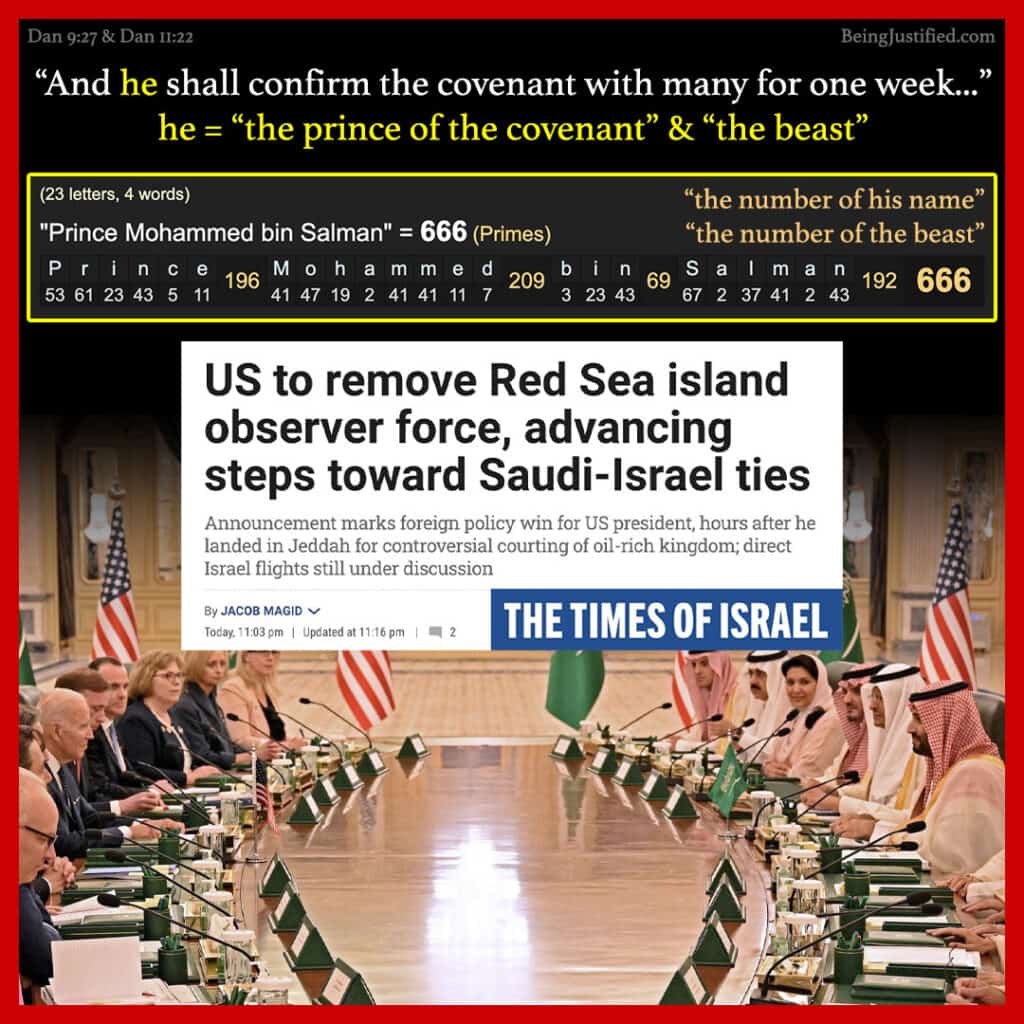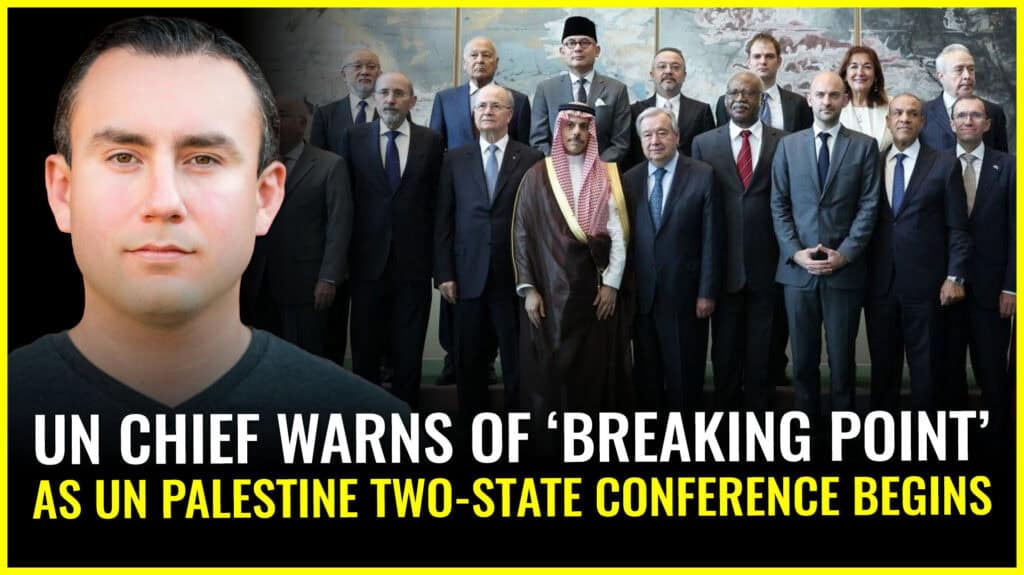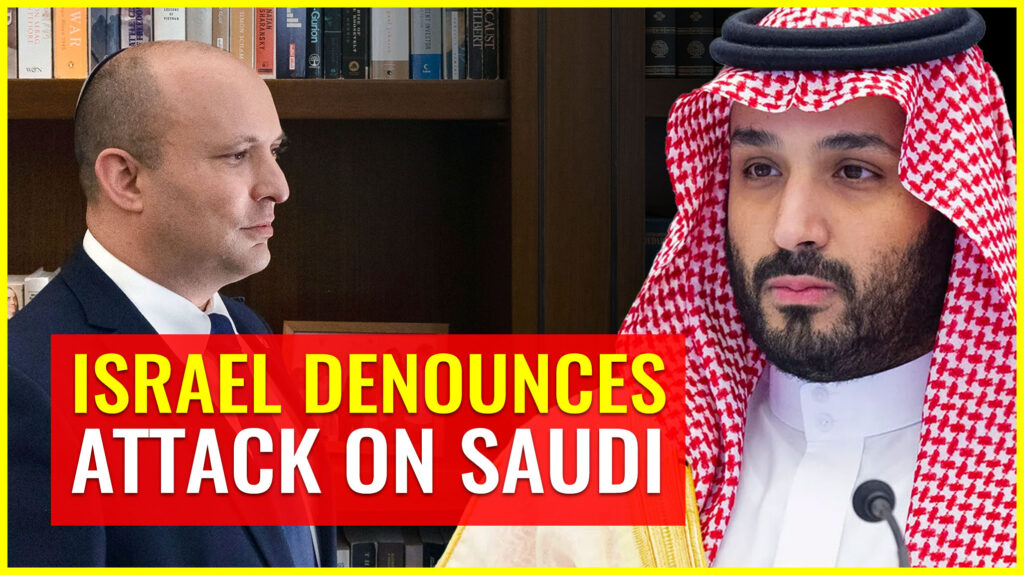Scripture to consider before the news:
“And he shall confirm the covenant with many for one week: and in the midst of the week he shall cause the sacrifice and the oblation to cease, and for the overspreading of abominations he shall make it desolate, even until the consummation, and that determined shall be poured upon the desolate.”
The he that will confirm the covenant (which is looking like the abraham accords) with many is the prince of the covenant who is looking to be Prince Mohammed bin Salman of Saudi Arabia. This week we have Jesuit Joe Biden touching down in the kingdom of the beast.
Let us see how closer we are for Prince Mohammed bin Salman confirming the covenant with Israel to begin the final prophetic 70th week from the book of the prophet Daniel.
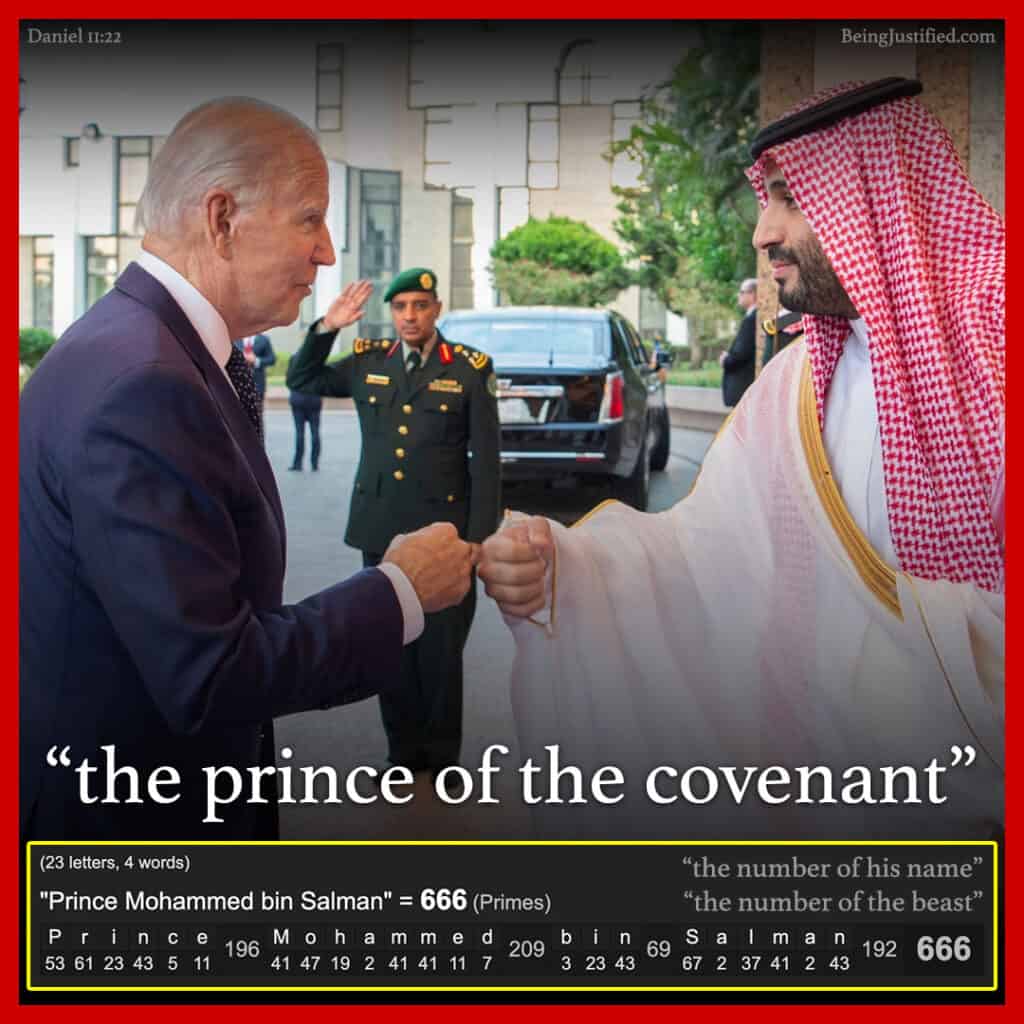
Now unto the news: Biden lands in Jeddah, set to announce more Saudi steps toward Israel normalization.
US President Joe Biden landed in Saudi Arabia Friday evening, on what was the first flight by an American leader from Israel to Jeddah, for a two-day trip during which efforts to integrate Israel further into the region will feature prominently.
Upon walking off of Air Force One, Biden was greeted by Makkah Province Governor Khalid Al Faisal along with Saudi Ambassador to the US Reema Bandar Al Saud. He boarded his motorcade shortly thereafter and headed to the Al Salam Royal Palace for a meeting with King Salman followed by a bilateral with Saudi Crown Prince Mohammad bin Salman and other ministers.
In a highly anticipated interaction, Biden fist-bumped the crown prince who greeted him outside the palace. The president greeted Israeli leaders the same way upon deplaning in Tel Aviv in what was seen as part of the White House’s COVID precautions, but then speculated as part of Biden’s effort to avoid having to shake hands with the Saudi leader who the CIA found was responsible for ordering the murder of Washington Post journalist Jamal Khashoggi in 2018.
In a press gaggle aboard Air Force One en route to Jeddah, US National Security Adviser Jake Sullivan indicated that there would be additional announcements on Israeli-Saudi ties during the visit, which came hours after Riyadh announced that it would open its airspace to all civilian airliners, including Israeli ones.
However, he declined to say whether direct flights between Israel and Saudi Arabia for Muslim pilgrims will be announced on the president’s trip, saying he would leave it up to Riyadh to reveal as it is the Custodian of the Two Holy Mosques.
The national security adviser joked with reporters that they need not get ahead of themselves, as the Saudi agreement on Thursday to allow Israeli flights to use its airspace is “cool” in its own right.
Sullivan said that the Thursday announcement from Riyadh was the first step toward normalization with Israel, “but it’s a big step.”
The opening of its airspace and allowing direct flights for Muslim pilgrims are the pair of steps Riyadh is readying to take in exchange as part of a broader agreement brokered by the US that will see control over a pair of Red Sea islands transferred from Egypt to Saudi Arabia.
Tiran and Sanafir were previously held by Israel, which agreed to transfer them to Egypt as part of their 1979 peace treaty while allowing a multinational observer force to remain and ensuring Jerusalem’s freedom of transport around the islands.
Accordingly, Israel’s sign-off was needed for the Egyptian-to-Saudi island transfer to go through, and the Biden administration leveraged the green light needed to push Riyadh to take steps toward normalization with the Jewish state.
The US had been seeking to finalize the agreement in time for Biden’s arrival, but US officials indicated they would not make an announcement until after the president’s meetings with Saudi officials.
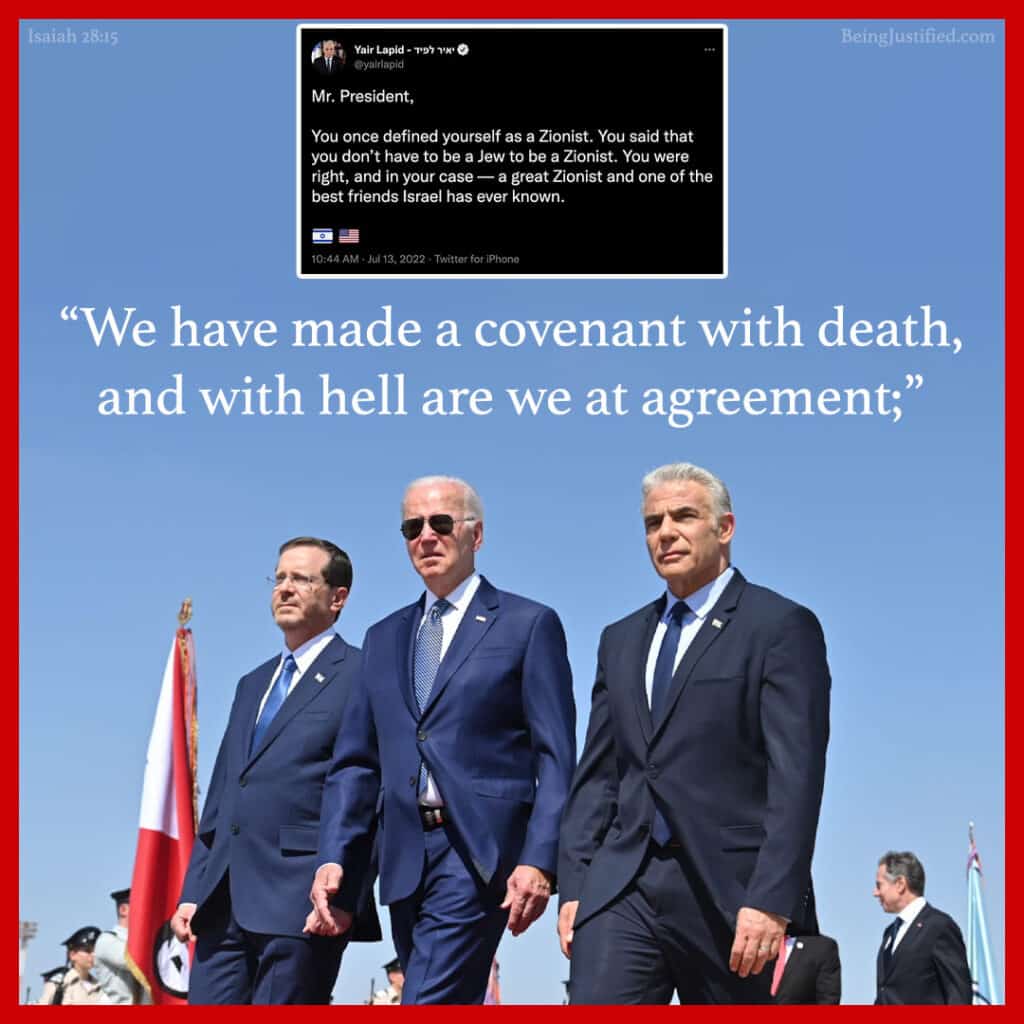
In brief remarks immediately after Biden’s departure, Prime Minister Yair Lapid said cryptically that Biden’s Wednesday-to-Friday trip to Israel also included “achievements that will take years before we can talk about them.”
He called the Saudi decision to open its airspace to Israeli flights a “first official step” in a larger diplomatic process to normalization with the Jewish state. “I thank the Saudi leadership for the opening of Saudi airspace.”
The day-and-a-half Saudi portion of Biden’s first Middle East trip as president, which followed two days in Israel and the West Bank, has earned a lot of focus due to the apparent about-face it represents in the administration’s policy toward Riyadh, after initially pledging to take a much harder line due to the kingdom’s human rights record.
But Russia’s invasion of Ukraine has led Washington to shuffle its foreign policy priorities, including encouraging Saudi Arabia to pump more oil in order to help lower gas prices in the US and decrease European dependence on Russian crude.
Biden, after initial hesitance to embrace the Abraham Accords normalization agreements that the Trump administration brokered between Israel and several Arab states in 2020, has gone all in on the initiative, describing the advancement of Israel’s integration in the region as a key goal for the Mideast tour.
The efforts bore fruit on Thursday when Saudi Arabia made the announcement regarding the opening of its airspace.
Riyadh has held off on formally establishing ties with Israel, saying it won’t do so without a resolution to the Israeli-Palestinian conflict.
Earlier Friday, Biden met in Bethlehem with Palestinian Authority President Mahmoud Abbas, who has largely opposed the Abraham Accords, viewing them as an effort to bypass the Ramallah after decades during which Israeli ties with Arab states were conditioned on Jerusalem reaching a two-state solution.
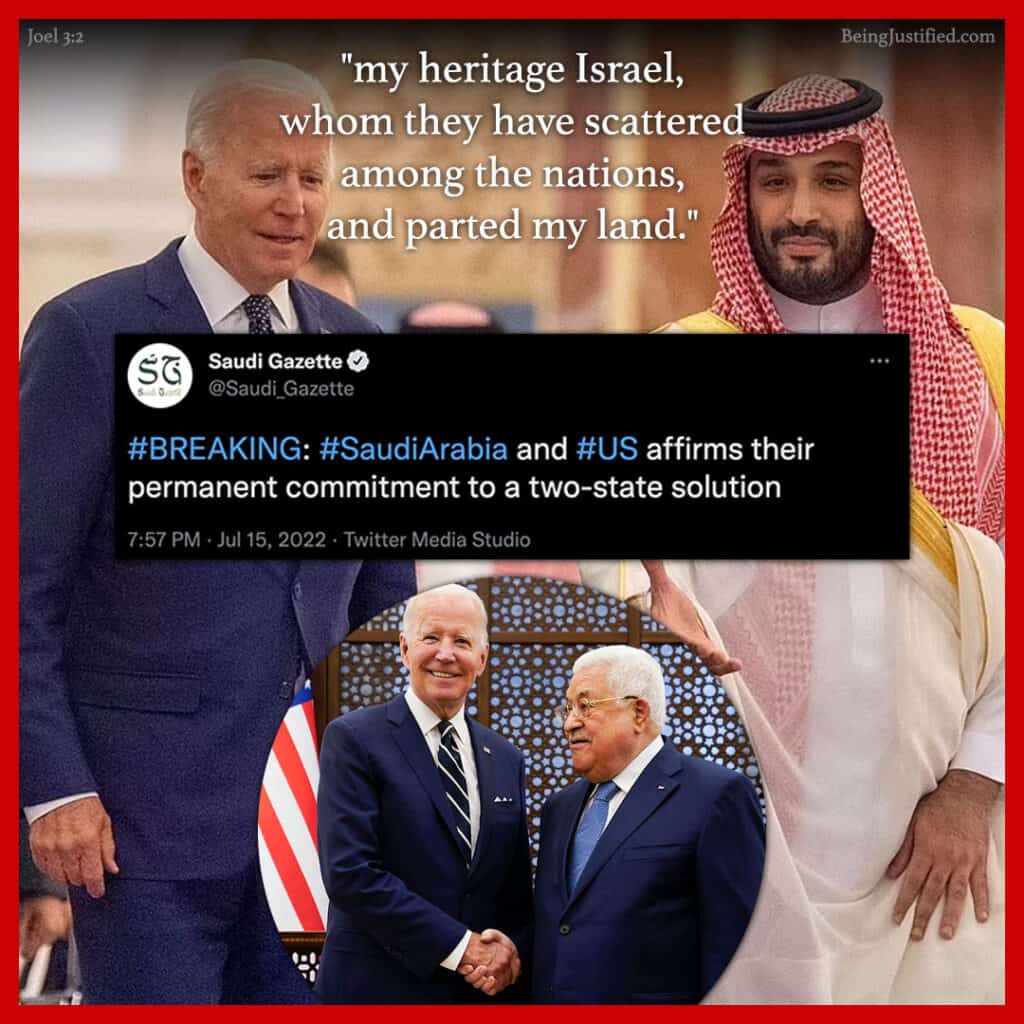
Scripture to consider:
“I will also gather all nations, and will bring them down into the valley of Jehoshaphat, and will plead with them there for my people and for my heritage Israel, whom they have scattered among the nations, and parted my land.”
God’s land of Israel will be parted, as it is written by the prophet Joel and it is looking like the Palestine two-state solution might just fulfill that scripture.
Sullivan told reporters on Air Force One that Biden “made the case” to Abbas for why Israel’s integration in the region can “reinforce progress on the Palestinian track.”
Abbas indicated during the post-meeting press conference that he had not changed his position on the matter, voicing his support for the 2002 Arab Peace Initiative.
That proposal offers Israel full normalized relations with all 22 members of the Arab League if Israel agrees to a two-state solution based on the 1967 borders and with a just resolution for Palestinian refugees.
The plan was never welcomed by Israel, which now argues that the Abraham Accords prove that the two-decade-old proposal is no longer relevant.
Saudi ties with the Palestinians have cooled in recent years, due in no small part to a frosty relationship between Saudi Crown Prince Mohammed bin Salman and Palestinian Authority President Mahmoud Abbas.
Riyadh reportedly refused several requests by Abbas’s office for him to visit the Gulf kingdom before Biden’s trip in an ostensible last-ditch effort to convince Saudi Arabia not to move toward normalization with Israel. Riyadh sufficed with a phone call between Abbas and the more traditionally pro-Palestinian, 86-year-old King Salman.
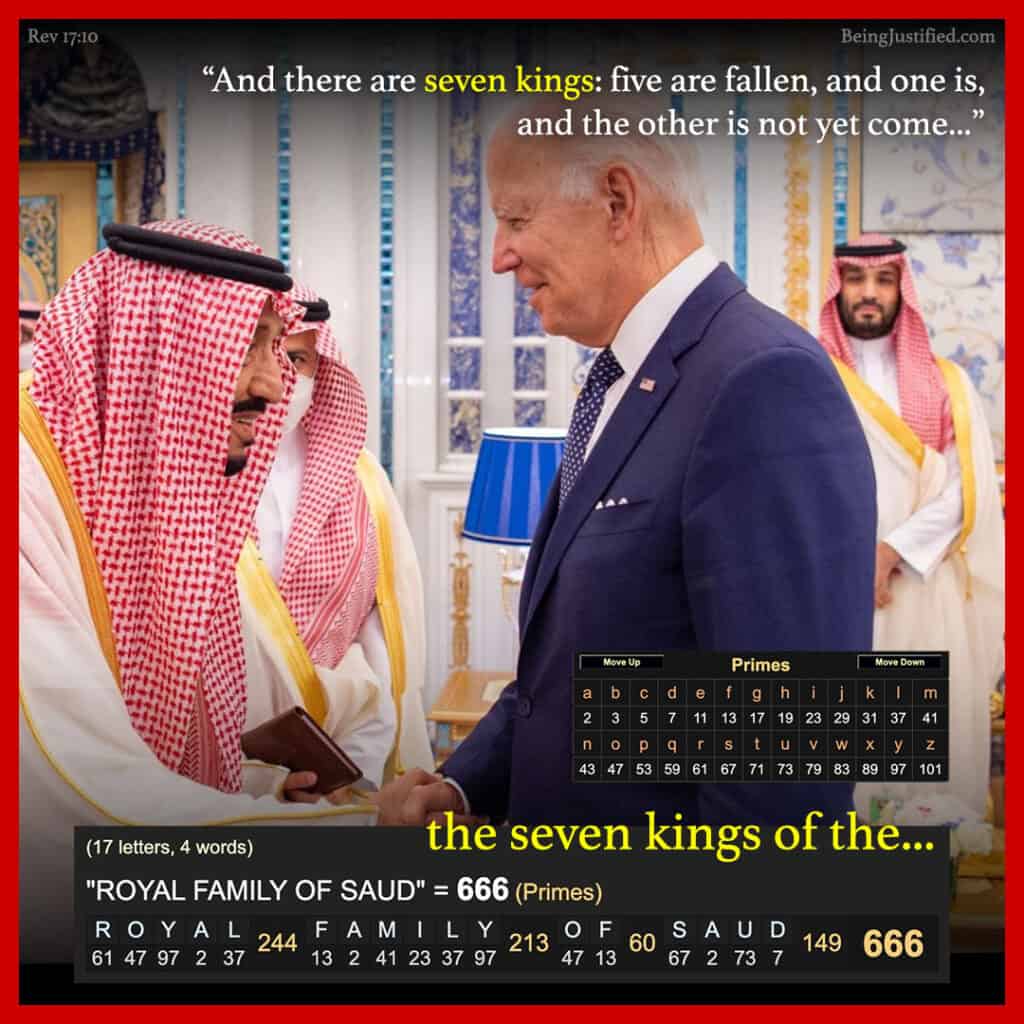
The 36-year-old crown prince is seen as more removed from the Palestinian cause, going so far as to say in March that Israel could be a “potential ally.”
For now, however, King Salman appears to hold veto power on full normalization with Israel.
Still, Israel lobbied aggressively for Biden to visit Saudi Arabia, identifying the opportunity to make progress toward normalization while also viewing repaired US-Saudi ties as a national interest in order to more effectively combat Iran.
On Saturday, Biden will participate in an expanded summit of the Gulf Cooperation Council known as the GCC+3, which will bring together the leaders of Bahrain, Kuwait, Oman, Qatar, Saudi Arabia and the United Arab Emirates along with Egypt, Jordan and Iraq.
He will subsequently hold separate bilateral meetings with the leaders of Iraq, Egypt and the UAE before flying back to the US on Saturday evening.
Addressing Biden’s planned Saudi trip on Thursday, Lapid asked the president to send a “message of peace” from Jerusalem.
“Our hand is outstretched for peace. We are ready to share our technology and experience, ready for our people to meet and learn about one another, ready for our scientists to collaborate and our businesses to cooperate,” he said during a press conference alongside Biden.
Mark it down: When Israel confirms the covenant with Prince Mohammed bin Salman, the final prophetic 70th week will begin. The last 7 years before the 2nd coming of the Lord.
